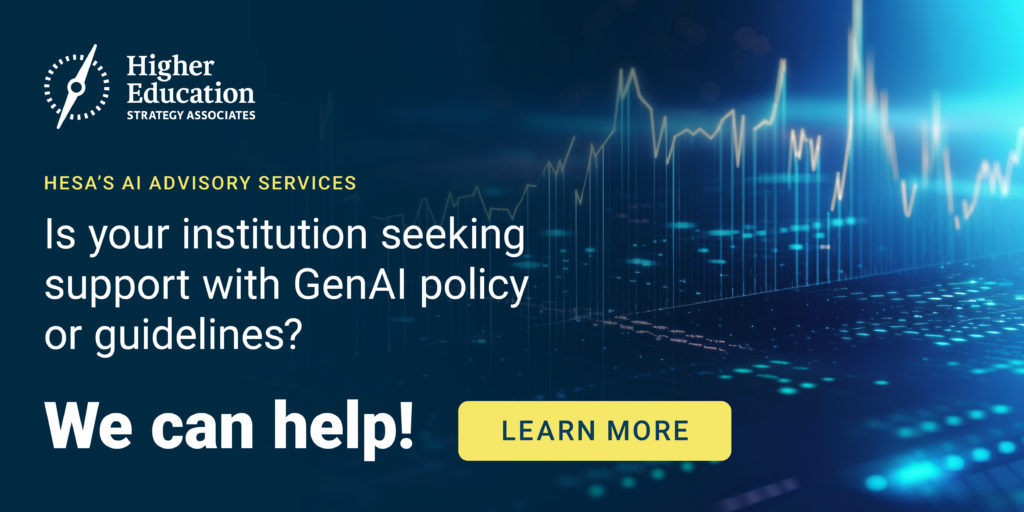Spotlight
Good afternoon all,
In today’s newsletter, we share an insightful research paper that touches on the future of AI in education and how to lay the foundation for more educational equity. We also share an article that elaborates on China’s recent Guidelines for Responsible Research Conduct, as well as articles on how GenAI can be incorporated into institutional operations to increase cost efficiency and better support students.
Also, ICYMI – HESA recently launched its AI Advisory Services. If your institution is struggling to develop its response to this new technology, or is simply in search of an extra hand, we might be able to help. Reach out to our team to discuss ways in which we could support your efforts.

Next Roundtable Meeting
Date: Tuesday, March 19th, 2024
Time: 12h00-1h00PM ET
oin us Tuesday, March 19th, from 12:00PM to 1:00PM ET, for our next AI Roundtable, which will focus on Governance and Policy. We will have the pleasure of welcoming the following panelists: Mark Daley, Chief AI Officer at Western University; Trish McLaren, Associate Vice-President Academic at Wilfrid Laurier University; and Shailoo Bedi, Executive Director of Learning and Teaching Support and Innovation at the University of Victoria. They will discuss their institution’s respective approach to building the institutional response to GenAI, whether it is to create a dedicated role to do so, or to create specific task forces or working groups. They will be asked about their institution’s respective journeys, and any specific opportunities or barriers to their approach. This session will be facilitated by Simon Bates, Vice-Provost and Associate Vice-President, Teaching and Learning, at the University of British-Columbia. Register now (it’s free!) to save your spot!
If you missed last month’s AI Roundtable on Research integrity, you can watch the recording here.
Are you a faculty member or an instructional designer who has been using GenAI tools in teaching and learning in innovative and practical ways? We invite you to present during our “community poster” session on Pedagogy and Curriculum roundtable in April (date TBD). Mention your interest here.
Policies & Guidelines Developed by Higher Education Institutions
Tags: Guidelines, Academic integrity, Pedagogy, North America
Thompson Rivers University’s (Canada) faculty guide on Artificial Intelligence in Education covers questions such as “Can I use GenAI tools in my teaching and research?”, “Is it cheating if my students use GenAI?”, “What can I do to encourage students to not use GenAI in my courses?”, “Is there a technology that can ‘catch’ usage of GenAI?” and “Are there ethical issues to consider beyond academic integrity?”.
News & Research
Bulathwela, S., Pérez-Ortiz, M., Holloway, C., Cukurova, M. and Shawe-Taylor, J. Sustainability. January 16th, 2024
In this article, the authors pose questions about the future of AI in education, with the aim of initiating “the pressing conversation that could set the right foundations for a new generation of education that is permeated with AI technology. The main goal of [their] opinion piece is to conceptualise a sustainable, large-scale and inclusive AI for the education ecosystem that facilitates equitable, high-quality lifelong learning opportunities for all.”
Sharma, Y. University World News. January 20th, 2024
At the end of 2023, China’s Ministry of Science and Technology published new guidelines on the use of GenAI in scientific research, “as part of its efforts to improve scientific integrity and reduce research misconduct. The new rules notably include a ban on the ‘direct’ use of GenAI tools when applying for research funding and approval. Under the guidelines, GenAI can still be used in research, but any content or findings that use the technology must be clearly labelled as such.” The document, called Guidelines for Responsible Research Conduct, is intended as a “guide for individual researchers and research institutes”. “Also in December, the National Natural Science Foundation of China […] released a set of integrity standards that require experts involved in evaluating science funding programs to first obtain NSFC permission if they plan to use GenAI in their work.”
Ascione, L. eCampus News. February 20th, 2024
Ivy.ai recently released their report “Unveiling the AI Effect: How Higher Ed Admins Adapt and Gain”, which followed a survey of more than 600 administrators. 78% of respondents who use AI believe it will lead do revenue growth for their institution, and 71% believe using AI will lead to cost savings. Half of those believe it will lead to lower tuition costs. Yet, the majority of administrators are not using AI to its full potential. Ethical and reputational concerns are at the forefront of educators’ minds.
Hanna, L. University World News. February 17th, 2024
Higher level of students need to juggle work commitments alongside their studies. GenAI tools can help streamline tasks, optimize time management and enhance student outcomes. Additionally, “proactive universities around the world are increasingly turning to smart technology for solutions to identify and intervene when students face challenges – be it financial or emotional”.
Zevallos, B. EAB. January 24th, 2024.
EAB spoke with higher education leaders and collected examples of how institutions are socializing AI use on their campus. In this piece, examples are presented in order of implementation effort.
More Information
Want more? Consult HESA’s Observatory on AI Policies in Canadian Post-Secondary Education.
This email was forwarded to you by a colleague? Make sure to subscribe to our AI-focused newsletter so you don’t miss the next ones.



 Tweet this post
Tweet this post

This article raises critical questions about AI’s role in education, especially regarding inclusivity and potential biases. I appreciate the focus on responsible implementation and the exploration of GenAI tools for both streamlining tasks and addressing student challenges. It’s a thought-provoking read that encourages a necessary conversation about shaping the future of AI in higher education.